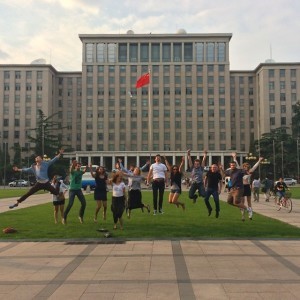By Ewa Berus
Global Business Journalism reporter
Ever wondered how it feels to be a “GBJer” in China? What problems and struggles will you meet? What kind of advantages will you get?
Ewa Berus shares her experience of studying Master of Global Business Journalism Program in Tsinghua University, perhaps, you’ll get more than just someone else’s answers to the questions above, perhaps, you’ll find some answers of your own.

The first time I came to China, it was with no expectations. I had signed a bilateral agreement with my home University in Warsaw and was now coming to Tsinghua University to complete the second (and final) year of my master program. Naturally, I had previously read about the school itself, but I tried to get rid of any stereotypes and images of China, which might have formed in my head over the years.
The first couple of days were overwhelming. I remember my first taxi ride from the airport, being stuck in traffic on a smoggy Monday morning, followed by an entire day of taking care of administrative tasks (in Chinese of course, not being able to speak a word of it at the time). I kept thinking, “What am I doing here?” And, as I lay in an unfamiliar bed in a tiny dorm room, not being able to fall asleep due to the time difference, it really wasn’t easy to find an answer. But the answer did come fairly quickly, along with the first sunny morning, when I woke up and realized this is my life now. And – well – it was pretty amazing. As cliché as it might sound, I needed this fresh start on (literally) the other side of the world to think about what I wanted to do with myself.
I guess we all ask ourselves that question – what do I want to do with my life? One thing I discovered while studying and living in China, is that not knowing is OK. Being unsure about your life and career choices is entirely normal. Before arriving at Tsinghua, I felt a growing pressure – I was reaching my final year at university and felt I had to make some big decisions (mainly: find a “real” job). Of course, life consists of choices, but the secret lies in the way we make them. Back at home I felt I had two or three good paths to follow – having studied marketing and management, I thought I’d end up in an advertising agency or the sales department of a giant corporation, like most of my classmates. At the time I thought that’s “the right way” to go, the “serious decision” to make.
Then I came to China to study in the Global Business Journalism program and suddenly – instead of focusing on subjects, which mildly interested me, I was writing articles and learning how to edit films, which was something I had always wanted to try, but never had the time or enough will to do (probably the second).

Being given the chance to study at a top Chinese university, along with incredible classmates and professors from all over the world, was a gift I am still thankful for. I stopped worrying about “finding my way” – because when you’re here, the answers seem to find you, as long as you remain open to them. Studying at Tsinghua has given me so many opportunities, both in terms of bettering my education, as well as opening to new ideas and making plans for the future. I learned that having options is usually better than having one strict plan. You can plan, but then reality tends to come and swoop you off your feet like a tornado, forcing you to adjust to the new circumstances. So you better be ready for it.
Studying – and in my case living – in a multicultural environment of Tsinghua campus was a unique experience, which allowed me to be exposed to so many new factors I would probably never have experienced, had I chosen to stay at home. Tsinghua University, as well as many other top Chinese universities, is a tiny universe in itself. Experiencing student life, along with its privileges and limitations, is like a trial before working in China (if that is your choice).

Being friends with people from so many different countries and cultures significantly broadened my horizons. It taught me to listen to others – really listen and give them my full attention – and be understanding towards the differences, which we might have. It’s fascinating to listen to Chinese and international friends, knowing that although we come from different parts of the world, we have so much in common.
There is beauty in the diversity of people, ideas and actions. China – in the eyes of an expat – is a clash of cultures, with the Chinese culture serving as the centerpiece and an arena of interactions. Being exposed to so many new factors and getting acquainted with people equally crazy as you, is absolutely amazing. Yes, you have to be a bit crazy to come to China and leave everything you know behind.
Coming here, be prepared that you will be challenged every step of the way. The differences – in culture, foreign customs and traditions, the language barriers and so many other factors – will often enough make you want to scream and question your choices (and occasionally – your sanity). But you know what? Each victory, even if only a small one, tastes so, so good. You get addicted to these challenges, because at the end of the day, they make you a stronger and better person. The thing with living and breathing in the smoggy air of Beijing is that everything is more intense. Maybe it’s the smog talking, but I appreciate this chaos. It made me more patient, definitely more balanced and helped me face my problems alone.

Of course “alone” is a questionable way to describe my existence in the world’s most populated country. However being away from family and friends was tough at first. Whenever something bad happens, you cannot just run back home to your safety zone and feel comfortable with your old friends. You have to deal with the problem and with yourself. But that’s an important lesson to learn. There is never a place or time, when we can feel happy and be surrounded by family and friends 24/7. I know spending some time alone made me stronger and more independent. It helped me get to know the person I am and the one I want to be.
Getting rid of old habits will allow you to make space for new ones. At first everything seems strange, but then you start to make connections – you find your new favorite places and create a network of friends and acquaintances. You find the perfect jiaozi place or milk tea stand, you find out (the hard way) when to avoid taking the subway or cab, and where to leave your bike so it doesn’t get stolen. You discover that a Chinese“yes” may not mean yes at all, and you learn to swivel around the Chinese style of communicating. Hopefully, you start liking this new reality around you and suddenly it starts feeling familiar, like a new home.

Speaking Mandarin is a huge step in making order out of the Chinese chaos around you. Not being able to speak the language is like listening to someone recite a poem, which you don’t understand – you hear it, but the sounds don’t make sense and you miss all the beauty and meaning of it. During my first trip to China, I learned just enough Mandarin to get by, but not enough to actually speak freely. The second time I came back to Beijing – for an internship at the Polish Embassy – I put more pressure on myself to learn how to speak. Now, exactly two years after my first trip to China, I came back to Tsinghua University to complete the Chinese Language Program. China has been pulling me back since the first time I set foot in Beijing, and it’s become a kind of addiction. If you – similarly to me – decide do dedicate a growing piece of your life to studying and working here, learning the language is crucial. So don’t get fooled by how easy it is for an expat to get by knowing only how to say “你好” and “这个.” I cannot stress this enough – if you’re thinking seriously about staying here, learn to speak the language.

If I were to sum up my experience of living, studying and working in China – it’s not all wonderful and easy. Actually, most of the time living in China will not be easy at all. It’s a struggle. A thrilling and beautiful struggle. And it’s not for everyone. It doesn’t have to be. But if you find yourself feeling good here, you should seize this opportunity you were given and squeeze the most out of your China experience. Whether it’s a brief fling or a burgeoning relationship, make the most out of it, because – I guarantee it – these memories will forever remain in your mind and may end up shaping you in more ways than you know. I’m not saying I have all the answers now. In fact, I have more questions than ever before. I feel my mind has opened up tremendously and that nearly everything is possible if I set my mind to it.

That’s what China has taught me – you never know what awaits around the corner, but there’s always a new opportunity coming up and if you’re willing to seize it, you can succeed. It’s up to you. So – “Promise me you will not spend so much time treading water and trying to keep your head above the waves that you forget, truly forget, how much you have always loved to swim.” Those are a poet’s words (by Tyler Knott Gregson), not mine, but I agree with them and encourage you to learn, explore and be open to the Chinese world around you. Good luck.
If you’d like to find out more about the program Ewa studied or you’d like to apply for Tsinghua University, contact us attsjcws@tsinghua.edu.cnor through our site.
The Global Business Journalism Program has borne rich fruit, with seven graduating classes ofabout 300 master's degree recipients from more than 50 countries. They are establishing themselves in domestic and foreign media, government, communications and educational fields.
Graduates are working in major media as China Daily, South China Morning Post, People's Daily, Economic Observer, China Securities Journal, Korean Broadcasting System, Xinhua News Agency, Global Times, Radio Beijing and China Radio International, as well as multinationals such as Deloitte, Ogilvy & Mather, Saatchi & Saatchi, Shell and IBM.
Results from an ongoing survey of employers shows they give high marks to the graduates for their journalism skills as well as their knowledge of business and global economics.
Alumni networking and activities
The GBJ program launched an alumni association and two alumni representatives were appointed, Tan Zhongyang (tanzy07@gmail.com) and Paul Wong (paulwong826@126.com), both from the class that entered in 2007.

